Estimated reading time: 8 minutes
Most people are storing their food wrong and don’t even know it. By refrigerating non-refrigerable goods, you are likely causing your food to spoil faster than it should.
You might be thinking that the fridge is like a cryogenic chamber where time moves slower, right? Wrong! Contrary to popular belief, not everything lasts longer in cold temperatures. Storing food is a little more complicated than that. There are foods that need to be kept at room temperature and there are even some fruits and vegetables that you just can’t put next to each other or they’ll spoil faster.
Want to save this post for later? Click Here to Pin It on Pinterest!
In this article, you’ll learn which foods you should NOT store in the fridge, along with some extra bits of food storage knowledge.
1. Vegetables and Fruits
When in doubt…don’t store your fruits or veggies in the fridge. The cold temperature causes their proteins to deflate quickly. Also, do NOT store fruits and veggies together. Fruits produce a gas called ethylene which speeds up the ripening process of other products around them.
Fruits and vegetables that give off this gas and are vulnerable to them include:
- Apples
- Apricots
- Avocados
- Bananas
- Kiwis
- Mangoes
- Eggplants
How to Store Fruits and Vegetables:
Store them in an uncovered bowl, on the counter out of the sunlight. Fruits in one bowl, vegetables in another – bananas completely separate.
Exceptions:
Once you slice a fruit or veggie, there’s no question that they need to be put in your fridge to keep bacteria and bugs from contaminating them.
2. Stone Fruits
Apricots, peaches, and plums. What do they all have in common? Well, they’re all seasonal fruits that are sensitive to the cold. Thus, putting them in the fridge would prematurely make them hard, tasteless, and mealy – while also lowering their nutrients.
How to Store Them:
Often, these fruits are bought before they’re at their best, so what you want to do is place them on a room temperature counter away from sunlight. When storing them, make sure they’re not packed too tightly to avoid bruising and to give them some room for air to circulate around them for freshness. Then, wait for them to ripen individually. If you want to speed up the ripening process, store stone fruit in a paper bag away from direct sunlight.
Exceptions:
Cherries don’t need further ripening after harvest, so you can stick them in the fridge as soon as you get home. You can also freeze them for long-term storage.
3. Root Vegetables
Temperature is key in storing root vegetables, so they need to be placed in a dry, room-temperature place. For instance, cold temperatures make onions moist and moldy, and they make potato starch more sugary.
Uncut shallots can’t be refrigerated, either. They end up rubbery and unpalatable. These guys need to breathe, so store them in the open.
How to Store Root Vegetables:
For vegetables like these, store them in paper bags; just don’t store potatoes and onions together or else they’ll spoil each other! Make sure to check them regularly because they’ll start sprouting if left out too long!
Exceptions:
Carrots, celery, beets, parsnips, radishes, and turnips need a bit of moisture to stay crisp. You can store them in the fridge or wrap them in a moist paper towel and store them on the counter in a room-temperature environment.
Related: 20 Foods That Store Well In Root Cellars
4. Berries
Berries such as strawberries and blueberries are meant to be eaten right away, rather than refrigerating them. The cold and the moisture can affect their bright taste and soft texture. If you want to give them a quick chill – 20 minutes in the fridge is just fine.
How to Store (and Rinse) Berries:
Eat right away after a quick rinse. Only rinse your berries right before you’re about to eat them, and then lay them on a paper towel to absorb excess moisture. If you plan to keep your berries longer than a few days, then you might be able to wrap them in a moist paper towel, place them in a zip lock bag, and store them for a day – depending on how ripe they are at the time of storage.
Exceptions:
Not all berries are the same. Some of the delicate-skinned ones (namely blackberries and raspberries) ripen faster than other berries. These berries need to be refrigerated right away because they’ll deteriorate within hours after buying them. Just make sure that your fridge isn’t on the coldest setting.
5. Bread
One surefire way to make bread go stale is by keeping it in the fridge. It might be able to prevent mold from growing, but it’ll also cause your bread to dry out faster. Sliced bread is especially vulnerable to this because this style has more surface area to be affected by air exposure which depletes the bread of moisture.
How to Store Them:
There are two ways to store bread: keep it in a bread box for days or keep it in the freezer for weeks.
Exceptions:
Absolutely none. It’s just freezer or bread box for this one.
Related: 7 Ways To Bake Bread Without Electricity
6. Nuts
Nuts actually have a pretty good shelf life and don’t need to be kept in the refrigerator. Remember that shelled nuts last longer than unshelled ones, and raw nuts last longer than roasted. They can last up to three months on the table but if you want to store them up to a year, you’ll have to freeze them.
How to Store Them:
The first rule of storing nuts is to keep them in an air-tight bag or container to maintain the right balance of moisture. Keep them away from sunlight and humid places because it causes the oil inside the nuts to become rancid. Also, make sure to keep them away from strong-smelling vegetables like onions and garlic; nuts will absorb their scent like a sponge.
Exceptions:
Chestnuts are the exception because they contain high-starch and low fat like potatoes. These guys can go bad fast, so store them in the fridge as soon as you can.
7. Herbs
There are so many variables that can cause herbs to wilt: too much moisture, too much light, too much oxygen, cold temperatures. It’s all about finding an environment with the right balance. Without proper care, green herbs like cilantro, basil, and parsley can go brown fast, and hardy herbs like thyme and sage lose their taste.
How to Store Them:
To keep the natural freshness of herbs, store them like you would flowers. With tender leafy herbs like basil or parsley, fill a jar with water and place them upright inside with the stems in the water.
As for those zesty herbs like rosemary, sage, and thyme – lay them lengthwise on a damp paper towel. Roll it and place it in a Ziploc Bag. Make sure it’s airtight so as not to release any oxygen and dry out the towel.
Related: 10 Ways To Preserve Fresh Herbs So They Don't Go To Waste
Exceptions:
There aren’t any! These two pretty much cover it.
8. Non-Perishable Goods
It goes without saying that canned and dry food like powdered milk and premade pasta don't need to be put in the fridge. They were made to last longer than fresh food, and the temperature has little effect on them. They’ll only take up space in your refrigerator.
For many canned or not-yet-opened prepackaged goods, the content’s quality is ruined when you store them in the fridge. Spreads like peanut butter can turn hard and lumpy when refrigerated, beans can grow a bacterial foam, and sugars need to sit in room temperature, too, because humid weather can cause lumps. Note that these ingredients can still degrade in time but last longer in the right temperature with a tight seal.
How to Store Them:
Keep canned or sealed goods in cool, dry places away from direct sunlight. Food in sealed jars don’t need to be refrigerated either, but direct sunlight can cause them to spoil, especially acidic products like tomato sauce. Make sure things in jars are tightly sealed.
Exceptions:
Be wary of non-perishable goods that are already opened. Let's say you open a bag of sugar – it will still last longer sitting on your table than in the fridge.
Related: 27 Foods That Last For Decades
What to Put in the Fridge ASAP – and How Long They’ll Last
- Meat and Fish: 2-3 days raw, 3-4 days if roasted
- Milk: 1 week
- Eggs: 4-5 weeks
- Cheese: 1-2 months in the fridge, 6-8 months in freezer
- Salad Dressings: 4 months for cream-based, 6 months for vinegar-based
- Asparagus: 3-5 days
- Cherries: 4-10 days
- Mushrooms: 4-7 days
- Leafy Green Vegetables: 3-4 days
- Chestnuts: 2-3 weeks
- Blackberries, Raspberries, Blueberries: 5 days
- Carrots: 4-5 weeks
- Celery: 2-3 days
- Beets: 3-5 days
- Radishes: 3-5 days
Are you feeling enlightened yet? Following these rules of thumb when it comes to refrigeration can keep your food lasting longer, tasting better, and costing you way less in the long run.
Pass this article on to your foodie friends, budget-conscious neighbors and those coworkers who feed a small army of kids every week. They’ll thank you.
Like this post? Don't Forget to Pin It on Pinterest!



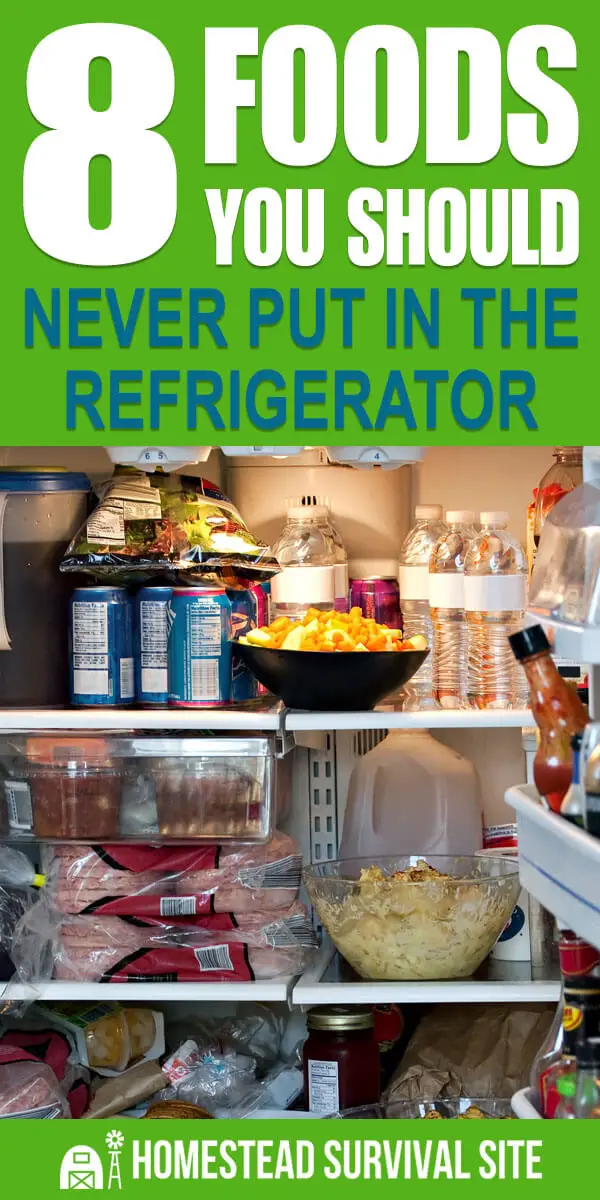

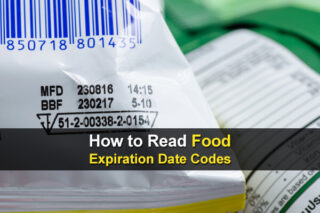
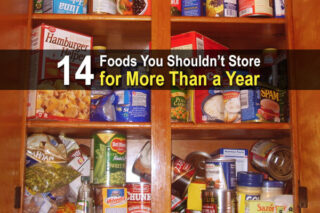


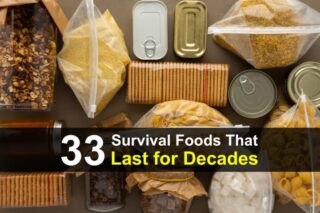
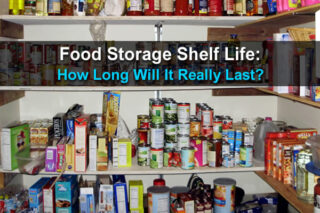


No plastic, vinyl, HDPE, is airtight…..none, regardless of the thickness. Plastic bags only delay the process of allowing air to the “sealed” product. Don’t believe me……put pet food in a plastic bag alongside a metal can, then note which they will be immediately attracted to. Another storage wisdom that’s really a Duh?….metal cans and mylar bags are the only easy to use storage containers that will keep food long-term. You’re begging trouble if you use a mylar bag without a bucket or other like container…..the mylar will protect from air, but not from the slightest puncture. May prepping go with you.